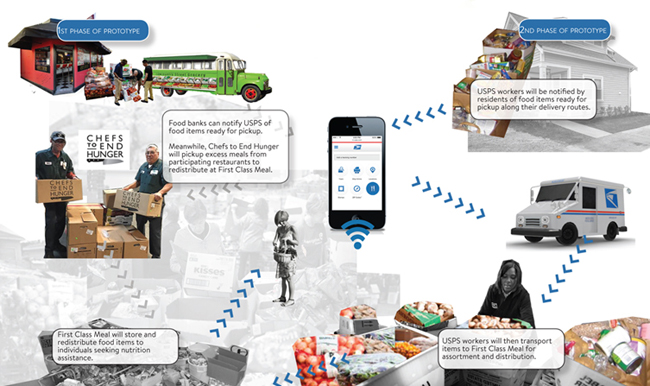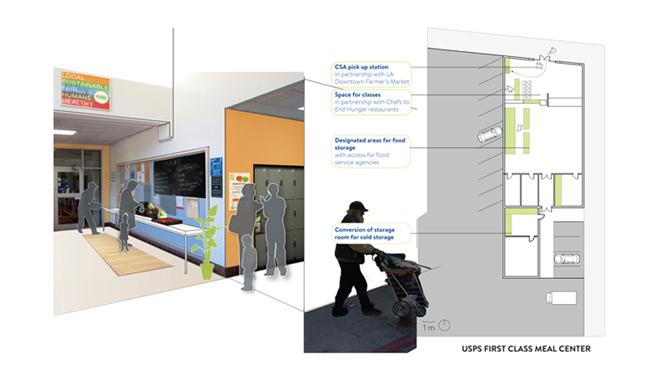Urban SOS winner “First Class Meal” suggests innovative food insecurity solution
Winner of the Urban SOS: Fair Share student competition, “First Class Meal” imagines a bold new mission for the distribution network and building stock of the United States Postal Service (USPS), creating a new kind of food infrastructure in Los Angeles. We speak to Anu Samarajiva, Irum Javed and Lanxi Zhang, three master’s students from Washington University in St. Louis, Missouri, to find out what inspired their vision.
What attracted you to this year’s Urban SOS theme of applying sharing economy principles to address urban infrastructure challenges?
Usually, the concept of the sharing economy evolves around the use of technology as the main catalyst for innovative change. However, the Urban SOS competition encouraged us to explore the spatial components of sharing and distribution systems to reach more equitable outcomes — two themes that tie into our prior experience and coursework in urban design and public health.
It’s really helpful and interesting to keep returning to our initial proposal over the course of the semester, adjusting it with feedback and real-life data. This is a process we go through in studio and classes, but this time, having an outside instigator helped keep us grounded in the real world. The challenge was also appealing because it’s bringing us together as an interdisciplinary team in a way that would not have happened through the academic demands of our regular coursework.

Using technology to connect need with supply, the team proposes evolving USPS’s package tracking system so food suppliers can notify drivers of available items for collection.
Your team proposes using the USPS distribution network and building stock to improve Los Angeles’s food infrastructure, particularly in neighborhoods with poor food access. What inspired this concept?
A prompt in the Urban SOS competition brief encouraged us to think about how to leverage government agency resources to better meet people’s needs. In their five-year strategic plan, the USPS describes itself as “the first social network” used to connect citizens across the nation, and we wanted to expand upon this definition through this competition proposal.
We wanted to connect underutilized capacity within the USPS (building space, trucks, and human capital resources) with the desire for increased reach and food storage capacity within food banks and agencies working to mitigate food insecurity. We are siting our exploration in Los Angeles, where a dynamic food culture is juxtaposes with the largest number of food-insecure individuals of any county in the U.S.[1]
“First Class Meal” has the potential to reinvigorate the USPS and more strongly define its role as a community resource while strengthening the existing network of community food providers. It is a proposal that requires cross-agency and interdisciplinary cooperation — not an easy process, but one which we believe is essential to address the problems of cities today.

“First Class Meal” envisions food banks, restaurants and households using USPS to increase food access in areas of need. USPS offices could be adapted to make them suitable for the expansion of services.
Your team includes students in urban design, landscape architecture, architecture and public health. Can you talk about how this mix informed your work and about the opportunities and challenges with multidisciplinary work?
Today’s urban challenges are complex and require input from multiple disciplines to create tangible and effective solutions. Lanxi and Anu are able to apply the analytical, research and representational techniques they have learned in urban design and pair it with Irum’s public health knowledge and focus on evidence-based research to approach this competition.
Because we all come to the table with different backgrounds and skillsets, we challenge each other’s assumptions and test each other’s knowledge. This multidisciplinary effort can add a degree of complexity to communication and production, but we feel our work is more interesting and provocative because of it. It reflects, at a small scale, the larger benefits of multidisciplinary efforts to address urban issues.
Urban SOS is a global innovation competition that challenges students to collaborate across disciplines to reimagine the future of our cities and pioneer unique solutions to urban challenges. The 2016 competition was themed Urban SOS: Fair Share and challenged students to combine the tools and technologies of the sharing economy with physical design to support more equitable access to resources, improve the built environment and enrich the quality of life of urban residents. Urban SOS: Fair Share was presented by AECOM and Van Alen Institute in partnership with 100 Resilient Cites. For more information on the competition visit aecom.com/urbansos.
[1] Map the Meal Gap Report, Feeding America, 2015






